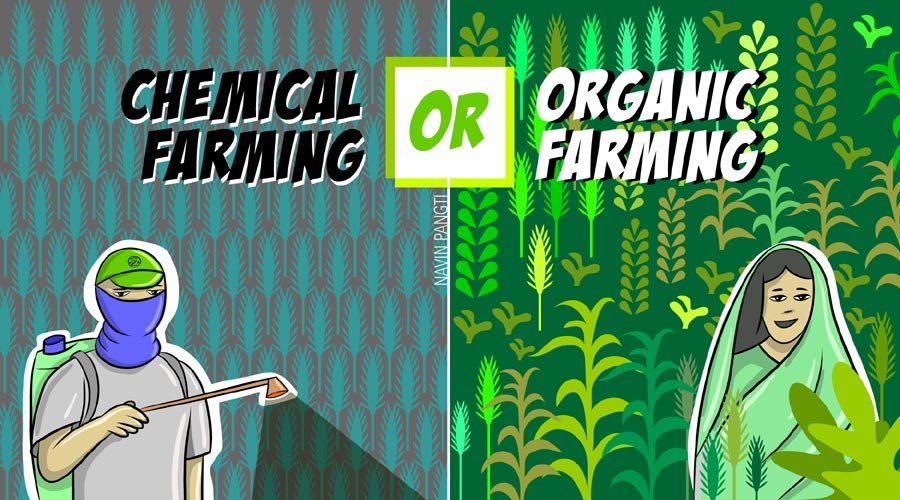Organic versus chemical farming – 18 key differences
Comparison between organic farming and chemical based farming articulated by Shri Bhaskar Save makes the choices pretty clear – Either we can fragment the web of life, or we can choose to nurture its wholeness!
In the year 2006, well-known natural farmer Bhaskar Save-ji wrote an open letter to Shri MS Swaminathan, who was appointed the Chairperson for National Commission on Farmers. I have shared that letter in the article – Open letter to the green revolution. The letter well articulates the views of Bhaskar-ji with regards to modern farming practices and the green revolution. I have also shared the two subsequent open letters that Bhaskar-ji wrote to Shri MS Swaminathan.
The first open letter also carried some annexures. One of them was a comparison between organic farming and chemical based farming. These comparisons made by Bhaskar-ji outlines all the major concerns with regards to chemical farming, and the evident benefits of an organic approach.
The book ‘The Vision of Natural Farming’ by Bharat Mansata, published by Earthcare Books, shares the context which led to this comparison. In the book, Bharat-bhai writes –
“In May 2005, I joined the Gujarat Organic Farming Yatra (A journey through the state) which began in the temple premise of the mother goddess, Umiya Mata, at Vandhai near Deshalpar, Kutchh, a very arid region. The turnout was almost a thousand, remarkable for a sparsely populated area. Bhaskar Save had reached before me. At the peak of the summer, when the temperature soured well above forty degree Celsius, his unflagging enthusiasm and energy could shame anyone half his age! Day one saw me wilting. But Bhaskarbhai, then 83, was clear he would accompany the Yatra through its entire journey starting from Kutch in the north, halting in Saurashtra, and ending finally at Bhatgam, in Surat district of south Gujarat.
I could see that Bhaskar Save’s talk had stirred the local farmers. Small groups thronged wherever he went. He later told me, “These people know they have to turn organic, or abandon farming very soon. Many have already stopped chemicals. The just cannot meet the high water requirement and input costs.”
Early next morning, I spotted Save on a bench under a tree, busy writing. He was noting (in Gujarati) the many differences between chemical farming and organic farming. When I caught up with him later that evening, he had listed 36 of them! Some, I felt, could be combined. This I did, summarising and translating 18 major points of difference.”

The 18 differences
- Chemical farming fragments the web of life;
Organic farming nurtures its wholeness. - Chemical farming depends on fossil oil;
Organic farming on living soil. - Chemical farmers see their land as a dead medium;
Organic farmers know theirs is teeming with life. - Chemical farming pollutes the air, water and soil;
Organic farming purifies and renews them. - Chemical farming uses large quantities of water and depletes aquifers;
Organic farming requires much less irrigation, and recharges groundwater. - Chemical farming is mono-cultural and destroys diversity;
Organic farming is poly-cultural and nurtures diversity. - Chemical farming produces poisoned food;
Organic farming yields nourishing food. - Chemical farming has a short history and threatens a dim future;
Organic farming has a long history and promises a bright future. - Chemical farming is an alien, imported technology;
Organic farming has evolved indigenously. - Chemical farming is propagated through schooled, institutional misinformation;
Organic farming learns from Nature and farmers’ experience. - Chemical farming benefits traders and industrialists;
Organic farming benefits the farmer, the environment and society as a whole. - Chemical farming robs the self-reliance (and self-respect) of farmers and villages;
Organic farming restores and strengthens it. - Chemical farming leads to bankruptcy and misery;
Organic farming liberates from debt and woe. - Chemical farming is violent and entropic;
Organic farming is non-violent and synergistic. - Chemical farming is a hollow ‘green revolution’;
Organic farming is the true green revolution. - Chemical farming is crudely materialistic, with no ideological mooring;
Organic farming is rooted in spirituality and abiding truth. - Chemical farming is suicidal, moving from life to death;
Organic farming is the road to regeneration. - Chemical farming is the vehicle of commerce and oppression;
Organic farming is the path of culture and co-evolution.















I truly believe in organic farming and try my bit whatever way I can. I try to promote it also by buying organic products. But one doubt remains regarding yield. If the entire farming in this planet turns to organic, will we be able to support 8 billion?
yes, why not? the world wastes nearly a half of its food produce only because it is ‘ugly’. will be posting the other two open letters next wednesday. the second open letter answers this query as well